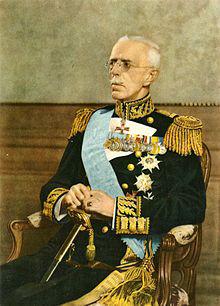

King of Sweden
16 June 1858 Drottningholm Palace, Stockholm, Sweden
29 October 1950(1950-10-29) (92) Drottningholm Palace, Stockholm, Sweden
NamesOscar Gustaf Adolf
King of Sweden King of Sweden Gustaf VColour photograph of Gustaf V of SwedenKing of SwedenReign8 December 1907 – 29 October 1950 PredecessorOscar IISuccessorGustaf VI AdolfPrime Ministers See list Arvid Lindman Karl Staaff Hjalmar Hammarskjöld Carl Swartz Nils Edén Hjalmar Branting Gerhard Louis De Geer Oscar von Sydow Ernst Trygger Rickard Sandler Carl Gustaf Ekman Arvid Lindman Felix Hamrin Per Albin Hansson Axel Pehrsson-Bramstorp Tage Erlander Born(1858-06-16 ) 16 June 1858 Drottningholm Palace, Stockholm, SwedenDied29 October 1950(1950-10-29) (aged 92) Drottningholm Palace, Stockholm, SwedenBurial9 November 1950 Riddarholmen ChurchSpouseVictoria of Baden (m. 1881; died 1930 )IssueGustaf VI Adolf of Sweden Prince Wilhelm, Duke of Södermanland Prince Erik, Duke of VästmanlandHouseBernadotteFatherOscar II of SwedenMotherSophia of NassauReligionChurch of Sweden Gustaf V on an award silver medal for horse breeding. Artist: Johan Adolf Lindberg. Gustaf V (Oscar Gustaf Adolf; 16 June 1858 – 29 October 1950) was King of Sweden from 1907 until his death in 1950. He was the eldest son of King Oscar II of Sweden and Sophia of Nassau, a half-sister of Adolphe, Grand Duke of Luxembourg. Reigning from the death of his father, Oscar II, in 1907 to his own death 42 years later, he holds the record of being the oldest monarch of Sweden and the third-longest rule, after Magnus IV and Carl XVI Gustaf. He was also the last Swedish monarch to exercise his royal prerogatives, which largely died with him, although they were formally abolished only with the remaking of the Swedish constitution in 1974. He was the first Swedish king since the High Middle Ages not to have a coronation and so never wore the king's crown, a practice that has continued ever since. Gustaf's early reign saw the rise of parliamentary rule in Sweden although the leadup to World War I induced his dismissal of Liberal Prime Minister Karl Staaff in 1914, replacing him with his own figurehead, Hjalmar Hammarskjöld, the father of Dag Hammarskjöld, for most of the war. However, after the Liberals and Social Democrats secured a parliamentary majority under Staaff's successor, Nils Edén, he allowed Edén to form a new government which de facto stripped the monarchy of virtually all powers and enacted universal and equal suffrage, including for women, by 1919. Bowing fully to the principles of parliamentary democracy, he remained a popular figurehead for the remaining 31 years of his rule, although not completely without influence – during World War II he allegedly urged Per Albin Hansson's coalition government to accept requests from Nazi Germany for logistics support, refusing which might have provoked an invasion. His intervention remains controversial to date, although not in support of fascism or the Nazi regime; his pro-German and anti-Communist stances were more outwardly expressed during World War I and the Russian Civil War, and he vocally criticised violence and persecution against Jews, including intervening vocally against the Holocaust in Hungary in 1944, demanding that Miklos Horthy cease deportations and supporting Raoul Wallenberg's effort. An avid hunter and sportsman, Gustaf presided over the 1912 Olympic Games and chaired the Swedish Association of Sports from 1897 to 1907. Most notably, he represented Sweden (under the alias of Mr G.) as a competitive tennis player, keeping up competitive tennis until his 80s, when his eyesight deteriorated rapidly. He was succeeded by his son, Gustaf VI Adolf.

We use cookies
We use cookies and other tracking technologies to improve your browsing experience on our website, to show you personalized content and targeted ads, to analyze our website traffic, and to understand where our visitors are coming from. Privacy Policy.